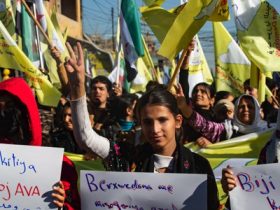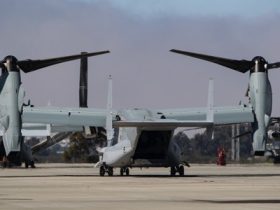European lawmakers approved a €35 billion loan for Kyiv, with the money set “to be repaid with future revenues from frozen Russian assets,” officials from the Strasbourg, France-based body announced Tuesday. The loan follows through on an agreement forged by G7 members in June.
Where the money comes from: “Approximately €210 billion in assets from the Central Bank of Russia are held in the EU and remain frozen under sanctions imposed over Moscow’s invasion of Ukraine in February 2022,” the European Parliament said. EU members have elected to use that money to support Ukraine’s military as well as reconstruction efforts across the invaded country.
To be clear, officials are “not confiscating sovereign Russian assets in Europe, but using the profits and interest accrued from them,” the BBC reports. The Brits are contributing nearly $3 billion of those funds for Ukraine’s military.
Fine print: The $37.8 billion loan “is conditional upon Ukraine’s continued commitment to uphold effective democratic mechanisms, respect human rights, and further policy conditions to be set out in a memorandum of understanding.” More from the EU, here.
Coverage continues below…
Welcome to this Tuesday edition of The D Brief, brought to you by Ben Watson with Bradley Peniston. Share your newsletter tips, reading recommendations, or feedback here. And if you’re not already subscribed, you can do that here. On this day in 1707, the British Royal Navy suffered one of its worst disasters at sea when four warships ran aground in poor weather off the Isles of Scilly, killing at least 1,400 sailors.
Developing: Officials in South Korea are openly considering arming Ukraine with lethal weapons, which Seoul has not done yet, the Guardian reports. “We would consider supplying weapons for defensive purposes as part of the step-by-step scenarios, and if it seems they are going too far, we might also consider offensive use,” the presidential official told reporters Tuesday.
South Korea could also send monitors inside Ukraine to more closely track “the tactics and combat capabilities of North Korean special forces dispatched in support of Russia,” Yonhap news agency reported Tuesday, citing an intelligence source.
The possible moves come in response to North Korean special forces training inside Russia for possible deployment against Ukraine. South Korea is sending a team of intelligence and military officials to NATO headquarters in Brussels some time over the next few days to detail their findings, according to Yonhap. That’s expected to be one of a possible series of “phased measures” Seoul is pondering in response to the North Korean developments.
From Seoul’s perspective, “North Korea will expect a generous payoff from Moscow in return for its troop contribution,” the country’s Ambassador to the UN Joonkook Hwang said Monday. “It could be either military or financial assistance. It could be nuclear weapons-related technology,” he said in New York.
Tactical considerations: “If North Koreans have to call for air support and artillery fire, language and procedural differences will be a challenge,” retired Australian Army Maj. Gen. Mick Ryan writes in his blog. “Will they operate fully integrated within Russian formations and be subject to the full command of Russian commanders? Or will they be under a form of operational command or control with caveats on their employment, such as not being used as meat troops?” A bit more, here.
Meanwhile on the battlefield, “Russian forces continue to systematically perpetrate war crimes, including the continued executions of Ukrainian prisoners of war and use of chemical weapons,” including chloropicrin, the Washington-based Institute for the Study of War writes in its latest Ukraine assessment published Monday. And perhaps unsurprisingly, “There is no evidence that Russia is holding Russian personnel accountable for the violations of the laws of war that have been reported,” ISW reports.
Update: Ukraine’s population has fallen by 10 million since Russia invaded in February 2022, with 6.7 million refugees living abroad, a United Nations official said Tuesday. Making matters worse, Ukraine now has the lowest birth rate in the world, according to Florence Bauer, the U.N. Population Fund’s Eastern European chief. Reuters has a tiny bit more.
Overnight Russian drone strikes killed at least three people, including a child in the northeastern city of Sumy, according to President Zelenskyy.
ICYMI: Ukrainian officials claim to have assassinated a Russian officer believed to be responsible for a cruise missile attack on a shopping center in the city of Kremenchuk in June 2022. That attack killed 22 people. The officer, Col. Dmitry Golenkov, served in Russia’s 52nd heavy bomber regiment. He was reportedly “found bludgeoned to death with a hammer…outside the village of Suponevo in the Bryansk region of Russia,” according to the Telegraph, reporting Monday.
Additional reading:
How two U.S. Army units are learning from each other’s experiments. As the service expands its “transformation-in-contact” equipping effort—adding four more brigades—units already in the program are sharing what they’ve learned. Defense One’s Sam Skove conducted a joint interview with two brigade commanders at last week’s AUSA conference: one of the original participating brigades and one new one. Read on, here.
Tragic update: Naval aviators who died in Growler crash were combat veterans just back from nine-month deployment. Lt. Cmdr. Lyndsay Evans and Lt. Serena Wileman, both 31, flew multiple missions over Yemen while defending commercial shipping from Houthi attacks, the Navy said in a Monday release. The wreckage from their F/A-18G was reached by 1st Special Forces Group (Airborne) troopers deep in the Washington state woods. More, here.
Related reading:
And lastly today: A former artillery specialist in the U.S. Army is now “one of Asia’s top chefs and a Netflix ‘Culinary Class Wars’ judge,” CNN reported over the weekend. His name is Sung Anh, and he’s the chef and owner of the highly-rated South Korean restaurant, Mosu Seoul. At the age of 13, his family emigrated to San Diego. He eventually enlisted in the Army, and was sent to Iraq to help “clearing out bombs and weapons,” allegedly “including the bunker where Saddam Hussein was found in 2003,” according to CNN.
But after four years in the Army, he entered a cooking school in California, where he eventually “worked in some of the West Coast’s finest kitchens, from the Michelin-star draped French Laundry to Benu and Urasawa.”
Check out the Netflix show he now stars in on the video streaming site here, or check out a trailer on YouTube, here.
Read the full article here








Leave a Reply